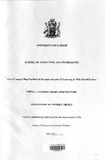| dc.description.abstract | Scaffolds are a good method of implementing self-regulated learning. Adaptive scaffolding
involves having an agent, for example a human tutor who helps the learners to plan their
learning, monitor their emerging understanding, use different strategies to learn, handle
difficult tasks etc.
The main aim of this project is to use the adaptive scaffolds in form of concept maps in webbased
e-Ieaming systems to play the role of learner guide. The learner creates a concept map
to show how he/she understands a certain domain of knowledge. The concept map takes into
account the prior knowledge that the learner has in that topic, and uses it to adapt to the user
level. The comparison between the concept map developed by the learner and the expert
concept map is used to determine the level of understanding of the learner, which is used for
the system adaptation by presenting the user with a concept map that matches his/her level.
This adaptation is implemented using reference rules to incorporate intelligence.
The concept map is also used for learner evaluation to determine the final understanding of
the learner in that topic. Thus, these concept map scaffolds are intended for use before, during
and after learning a certain topic in order to make understanding of the topic by the learner as
easy as possible. | en |

